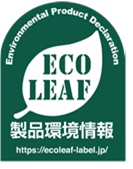News Release
JFE Steel Corporation
JFE Steel Receives Certification for Steel Plate Products
Under Japan’s “EcoLeaf” Environmental Product Declaration Program
JFE Steel Corporation announced today that three of its steel products—steel plates for shipbuilding, steel plates for offshore structures and wind-turbine support structures, and submerged arc longitudinal welded (SAWL) pipes—have received EcoLeaf certification from the Sustainable Management Promotion Organization (SuMPO) in Japan, enabling customers to quantitatively and objectively evaluate the lifecycle environmental impact of these products based on data from JFE Steel that has been confirmed fairly and reliably through third-party examinations and verifications.
EcoLeaf is a Type III environmental product declaration (EPD) in Japan that complies with the ISO 14025:2006 standard (Environmental labels and declarations – Type III environmental declarations – Principles and procedures) for quantitative disclosure of the environmental impact of products and services from raw material procurement to disposal and recycling.
JFE Steel’s newly certified steel plate products, which achieve high strength, weldability and cost performance, are widely used in steel structures. Customers can now use these JFE Steel products with even greater confidence and assurance thanks to their EcoLeaf-certified transparent disclosure of environmental impact.

EcoLeaf badge of SuMPO’s EPD program in Japan
To support the EcoLeaf program, the Japan Iron and Steel Federation developed the Product Category Rule (PCR1) for calculating environmental impact, which was approved in August 2019. The PCR complies with the ISO 20915 and JIS Q 20915 standards, both of which account for recycling capacity when determining quantitative environmental impact.
JFE Steel’s parent company JFE introduced its JFE Group Environmental Vision for 2050 as part of a broad-based initiative to achieve carbon neutrality by 2050, under which JFE is actively expanding its groupwide initiatives to reduce CO2 emissions through eco-friendly products. JFE Steel, in addition to reducing its own direct CO2 emissions, is committed to contributing to a more sustainable world by supplying high-quality, eco-friendly steel products that offer excellent recyclability for continued reuse over and over as well as per-unit environmental impact in manufacturing that is significantly lower than that of many other materials.2
1 Basic rules pertaining to the methods for calculating and disclosing environmental impact values for each product type with respect to EPD and EcoLeaf label. PCRs for screw-joint rebar were developed in 2018 and then expanded to cover all steel products in August of that year. PCRs conforming to JIS Q 20915 also have been formulated.
2 The greenhouse gas emissions of steel products per equivalent functional component are about one-fourth to one-fifth those of aluminum and carbon fiber. See JFE Group CSR Report 2023, Value of Steel.
About JFE Steel Corporation
JFE Steel Corporation, one of the world’s leading integrated steel producers, was established through the consolidation of NKK Corporation and Kawasaki Steel Corporation in 2003. The company operates several steelworks in Japan and numerous branch offices and affiliates throughout the world. JFE Steel leverages world-class technologies and know-how to produce a wide range of products based on its “Only One, Number One” strategy of focusing on unique and best-in-class products. The company reported consolidated sales of 2,255 billion yen and consolidated crude steel output of 23.96 million tons in the fiscal year ended March 2021.
# # #



